Donkeys are not inherently aggressive animals by any means. But like any animal, donkeys can and sometimes do show aggression. Usually, this isn’t aimed at humans, but instead, donkeys will most likely show aggression to predators who mean them harm. But how do donkeys really show aggression? And how can you keep yourself safe from an aggressive donkey?
Let’s find out.
Donkeys and aggression: How do donkeys show aggression?
Donkeys can show aggression in several ways, some more serious than others. Some of the first ways a donkey might show aggression are pinning its ears back, shaking its head, flaring its nostrils, snorting, and braying. In combination with one another, these can all be warning signs of more serious signs of aggression to come. The more serious signs of aggression that donkeys show are biting, charging, and kicking.
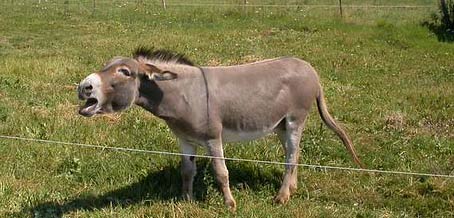
Donkeys’ ears and head tossing
One of the first signs of distress or aggression for a donkey will be their ears becoming pinned back flat against their heads. A donkey’s ears being pinned back can be confusing because it can also signify that they are excited, so look for other signs of aggression, too.
Another form of aggression is what looks like the donkey angrily shaking its head. The donkey could be shaking its head either up and down or back and forth. The reason could be that the donkey is unhappy with a situation or because they do not want to do what you are telling them to do. But it could be more serious than that when combined with other signs of aggression.
Like the ears being pinned back, some donkeys shake their heads as a way to show their excitement. Assume aggression until you know your donkey’s body language. It won’t take long to learn your donkey’s signals. They are very expressive animals and will definitely let you know what they are feeling one way or another.
Flared nostrils and snorting
Flared nostrils are another natural sign of aggression. Since they are, in a way, preparing for a fight, they are breathing more heavily, which makes the nostrils flare out. It is important to note that you might see flared nostrils because your donkey has been chasing its best friend for too long and is out of breath. Flared nostrils are not necessarily a sign of aggression by themselves.
Snorting can be a sign of aggression, too. But it can also indicate that the donkey is upset or afraid. The donkey might be trying to indicate that a predator is too close, or maybe they are trying to tell you that they don’t want to be brushed right now.
Braying
Donkeys bray a lot. They can be noisy animals. But incessant braying is usually a sign of agitation and means that the donkey is upset about something. For example, a donkey braying loudly could be telling another animal in the pasture that it’s upset that it bumped into it. Or it could be something more serious like warning a nearby predator not to come any closer.
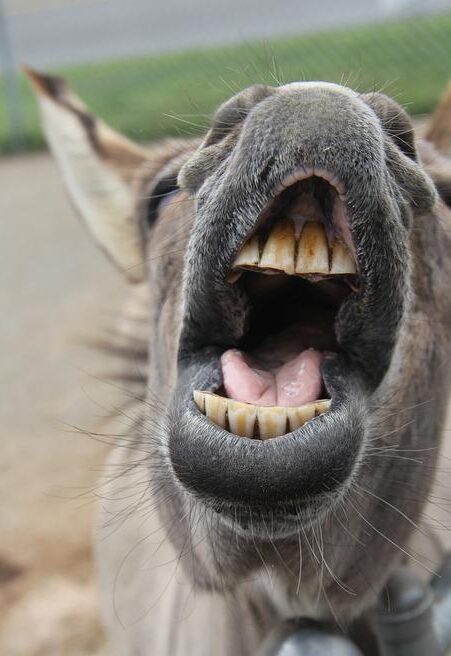
Kicking at the ground
If a donkey is guarding its herd against a predator, it will paw aggressively or kick out at the ground as a way to tell the other animal to back up and get out of there. They will also make a show of squaring up to the threat head-on as an intimidation tactic. But a donkey simply being aggressive might be seen doing this to its owner or other animals in its pasture.
Biting
Biting can be a donkey’s best line of defense. But it can become a problem if a donkey becomes aggressive and starts biting at things, people, and animals he shouldn’t be biting at. Unchecked, some donkeys even bite and kill small animals like chickens and ducks by biting and tossing them in the air to the ground. A donkey could also bite a human, which can be quite painful.
Kicking
One of the clearest ways donkeys show aggression is through kicking. It is a self-defense mechanism, but an aggressive donkey will use it inappropriately against small animals, for which it can be deadly. An aggressive donkey might also use it inappropriately against humans and hurt them.
Charging
Charging at something or someone is another way donkeys show aggression. Again, as a self-defense mechanism, this works great for the donkey. When used by a donkey against someone or an animal who isn’t a threat to them, life with the donkey can become quite difficult for the owner.
When will a donkey show aggression?
There are a few reasons a donkey might show aggression. The first is simple in that the donkey needs to defend itself. For example, a predator is circling in on the donkey, and he feels threatened. The donkey might bray, kick, and bite to save itself.
Another reason might be that another donkey is encroaching on his territory. A jack, an uncastrated donkey, can be very territorial and aggressive towards any other donkey or sometimes even other species who get in his space.
A few other reasons for aggression could be that the donkey hasn’t been adequately socialized and trained, might be afraid, might be in pain, might be frustrated, or might be bored, or frustrated because of hormones.
Another reason, unfortunately, that a donkey might show aggression is because of abuse and neglect. Jacks are the most commonly rescued donkeys, and they are most often the victims of abuse. Their previous owners didn’t know how to handle their aggressive tendencies and treated them cruelly.
Talk to your veterinarian
If your donkey has started behaving differently or exhibiting concerning behaviors, have your vet out for a visit. Your vet will want to make sure there isn’t an underlying cause. For example, if your donkey is kicking out, perhaps its foot is hurting, and it’s something your vet could solve. Or maybe your vet will remind you that this is the age that hormones begin to kick in, and it’s time to get your donkey castrated. Or perhaps if it has already been castrated, the castration failed and needs to be redone.
Have your vet focus on your donkey’s teeth or hooves if it has been biting or kicking excessively. These behaviors could be signs of mouth or tooth pain or leg or hoof pain. There could be any number of reasons for the change in behavior, so talk to your vet. You don’t want your donkey to have been in pain and you not to have known it.
How to keep yourself safe from an aggressive donkey?
To keep yourself safe, make sure someone is always with you when you are around any aggressive animal. In the worst-case scenario, someone will need to go for help. With that being said, depending on the severity of the donkey’s aggression, don’t get in a position where it can hurt you. For example, don’t enter a small, enclosed space with the aggressive donkey. If the donkey were to charge at you, you’d need to be able to away quickly.
Another tip is don’t underestimate a donkey. Donkeys are intelligent creatures. Don’t turn your back on an aggressive donkey, as it will certainly take advantage of the opportunity.
Do your best to be patient and calm when around the donkey. Aggression in donkeys around humans is typically a fear response. The donkey may be afraid of something currently, or maybe it had a traumatic past. Be gentle, talk slowly, calmly, sweetly, and don’t make sudden movements. Patience is key. Work on gaining its trust.
Train your donkey
Training is incredibly important whether you raised your donkey from a young age or rescued it from a bad situation. For example, if your donkey tries to bite you, quickly and firmly say ‘No” and at the same time give a light pull on its halter. This correction should be all that’s necessary to correct the behavior.
By no means do you want to frighten the animal or punish it. Positive reinforcement is far more effective, but the animal needs to know what is not allowed. If your donkey brings its mouth by you to do the same thing again, quickly give him a treat before he can bite you. In doing so repetitively, he’ll eventually associate bringing his face close to you with treats and praise, and he’ll forget all about his desire to bite.
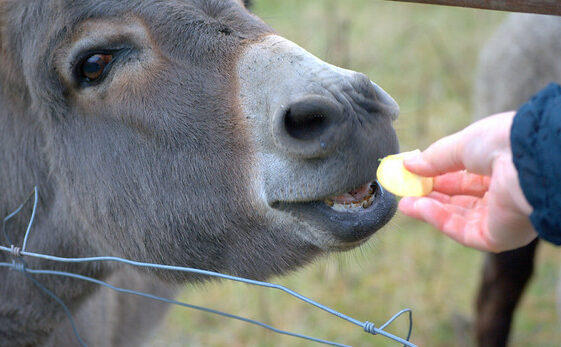
Training a rescue donkey with a difficult past can take a bit longer, but it is entirely doable with patience, love, and positive reinforcement.
Conclusion
Donkeys don’t usually show aggression without reason. It could be due to a number of factors like frustration, stress, annoyance, lack of socialization or training, abuse, neglect, fear, health problems, predators, and more. Donkeys show aggression in various ways, some more severe than others. Some of the ways a donkey might show aggression include pinning its ears back, shaking its head, flaring its nostrils, snorting, braying, and more serious signs of aggression like biting, charging, and kicking. It is recommended to talk to your vet if you have concerns.
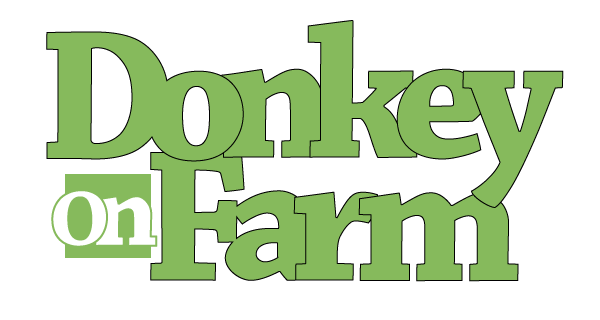
![How Do Donkeys Show Aggression? [Plus Tips to Stay Safe] How Do Donkeys Show Aggression](https://donkeyonfarm.com/wp-content/uploads/2022/06/How-do-Donkeys-Show-Aggression.jpg)

![Do Donkeys Laugh? [Plus Why Do They Do It?] do-donkeys-laugh](https://donkeyonfarm.com/wp-content/uploads/2022/08/Why-do-donkeys-laugh-270x180.jpg)
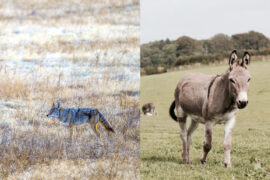
![Do Donkeys Make Good Pets? [Plus What to Know Before You Get One] Do-Donkeys-Make-Good-Pets](https://donkeyonfarm.com/wp-content/uploads/2022/05/Do-Donkeys-Make-Good-Pets-270x180.jpg)
![Are Donkeys Dangerous to Dogs? [Plus How to Keep Your Dog Safe] Are-Donkeys-Dangerous-to-Dogs](https://donkeyonfarm.com/wp-content/uploads/2022/07/Are-Donkeys-Dangerous-to-Dogs-270x180.jpg)